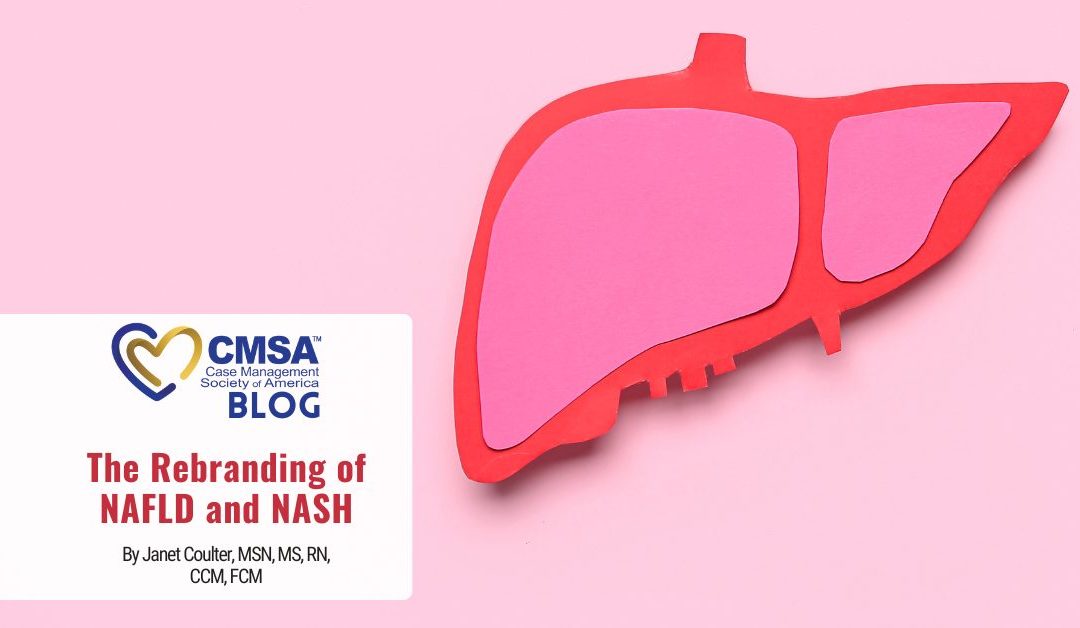By Janet Coulter, MSN, MS, RN, CCM, FCM
Nonalcoholic Fatty Liver Disease (NAFLD) has been rebranded as Metabolic Dysfunction-Associated Steatotic Liver Disease (MASLD). Nonalcoholic Steatohepatitis (NASH) has been renamed Metabolic Dysfunction-Associated Steatohepatitis (MASH). Why is this important? Most people think alcohol is the primary cause of liver disease, and that is not true. Many healthcare professionals felt that the terms "nonalcoholic" and "fatty" were stigmatizing and should be rebranded. It is just a change in semantics. In the 1980's, the terms NAFLD and NASH emerged to describe patients with chronic liver disease who deny excessive alcohol consumption. However, it became increasingly evident that the existing terminology was not adequate.
In June 2023, the journal Hepatology revealed new terminology for one of the world's most rapidly growing diseases. The terms Nonalcoholic Fatty Liver Disease (NAFLD) and Nonalcoholic Steatohepatitis (NASH) were retired and replaced with more precise and descriptive terms Metabolic Dysfunction-Associated Steatotic Liver Disease (MASLD) and Metabolic Dysfunction-Associated Steatohepatitis (MASH).
The new names have a serious tone. This is a severe disease. MASLD is the most common cause of chronic liver disease around the world. It affects more than 30% of the global population and is the leading cause of liver-related morbidity and mortality. It is a chronic, progressive condition and is associated with metabolic syndrome, obesity, dyslipidemia, excess belly fat, and type 2 diabetes mellitus. Insulin resistance MASLD is caused by a buildup of fat in the liver. MASLD is becoming the most common indication for liver transplantation and the primary underlying etiology for the development of liver cancer. MASLD is the buildup of fat in the liver. It is not caused by drinking too much alcohol but instead is more closely related to changes in metabolic health. Genetics may also be a factor. The excess fat prevents the liver from removing toxins from the blood and can sometimes lead to inflammation and liver damage.
Metabolic dysfunction-associated steatohepatitis (MASH) is the replacement term for NASH (nonalcoholic steatohepatitis). MASH is a subcategory of MASLD. MASH occurs when inflammation caused by fat in the liver progresses to fibrosis, scarring, and damage to the liver cells. If not caught in time or left untreated, this can progress to cirrhosis, liver failure, and hepatocellular carcinoma.
A new category was also coined called MetALD. The termed MetALD describes those with MASLD who consume alcohol per week (female patients who consume 20 and 50 g of alcohol daily (140-350 g/weekly) and male patients who consume between 30 and 60 g of alcohol daily (210-420 g/weekly). Females who drink less than 20 g of alcohol per day and males who drink less than 30 g of alcohol per day would be considered MASLD patients. The term MetALD indicates alcohol could have been a contributing factor but not the sole cause of the disease.
Most people with MASH or MASLD experience no symptoms and are unaware of the condition. Blood tests most often identify it. A liver biopsy diagnoses MASLD. As this disease worsens, it may present symptoms such as weakness, loss of appetite, nausea, jaundice, ascites, swelling in the legs, or mental confusion.
The main goal for treatment would be to prevent MASH from becoming cirrhosis. Interventions include lifestyle changes such as weight loss, healthy eating, exercise, and reducing cholesterol and triglyceride levels. In addition, taking prescribed medications to lower cholesterol, better control diabetes, and alcohol abstinence are effective. Cardiovascular disease risk must be accurately assessed and managed as cardiovascular disease is also a leading cause of mortality.
Patients with severe MASLD need to be identified and referred to a hepatologist. A primary care physician can follow patients with less severe disease. Lifestyle intervention is the cornerstone of the management of patients with MASLD.
Remember, MASH and MASLD can be reversed if diagnosed and treated early. Prevention and early detection are key. Eating healthy and maintaining a healthy exercise routine is essential.
There is much work to be done to increase awareness of MASH and MASLD and reduce the stigma associated with liver diseases. The term "metabolic dysfunction-associated" better describes what is happening to the vast majority of patients with liver disease who would not be classified as alcoholics. Eliminating the words "fatty" and "alcoholic" is only a start.
Join CMSA in-person for Case Management Boot Camp, March 8-10, 2024, in Nashville, TN! https://cmsapmg.wpenginepowered.com/cmsa-boot-camp/ Explore ethical practices, healthcare reimbursement, versatile skill sets, communication techniques, and more, earning 19.5 RN, SW, and CCM CEs over two and a half days of in-person instruction. Don't miss this unique opportunity to start strong in case management, learn about other CM practice areas, or get back to basics. Head to Nashville for an unforgettable, interactive learning experience! Deadline to register is March 1. Space is limited!
Janet Coulter, MSN, MS, RN, CCM, FCM is a transplant case manager with a wide variety of experiences including educator, administrator, team leader, and Director of Case Management. Janet holds a Master of Science in Nursing from West Virginia University and a Master of Science in Adult Education from Marshall University. She has published many articles in CMSA Today and the Professional Case Management Journal and served as a reviewer for the Core Curriculum for Case Management Third Edition. She currently serves as President-Elect of CMSA,, Chair of the CMSA Today Editorial Board, Chair of the Nominations Committee, and Vice-President of the CMSA Foundation board. Janet was the recipient of the CMSA National Award of Service Excellence and Southern Ohio Valley CMSA Case Management Leadership award and was recently inducted as a Case Management Fellow from CMSA.


Thanks Janet, this makes so much sense. I am so glad they rebranded both as it is less confusing. People automatically thought liver disease was always alcohol related. So glad they took out alcohol.